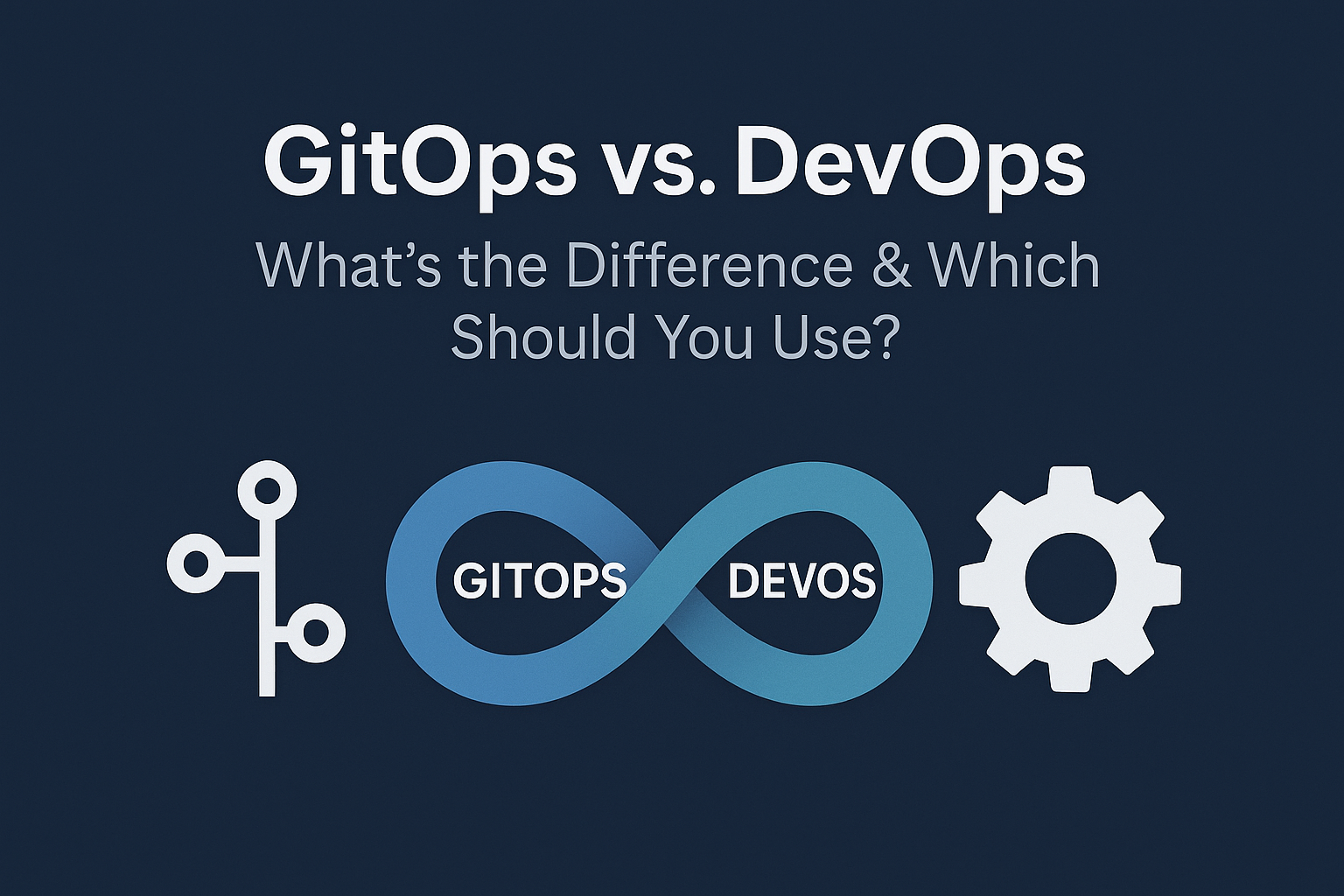GitOps vs. DevOps: What’s the Difference & Which Should You Use?

In the world of modern software development and infrastructure automation, DevOps has become the de facto standard for breaking down silos between development and operations teams. But in recent years, a new operational model called GitOps has gained traction—especially in the context of Kubernetes and cloud-native applications.
While GitOps and DevOps share the goal of improving delivery speed, reliability, and collaboration, they differ in how they implement those goals. In this blog, we’ll unpack:
What GitOps and DevOps really mean
The differences between the two
When to use GitOps, DevOps—or both
What is DevOps?
DevOps is a cultural and technical movement aimed at unifying software development (Dev) and IT operations (Ops). It emphasizes:
Collaboration between developers and operations
Automation of CI/CD pipelines
Monitoring and feedback loops
Infrastructure as Code (IaC)
The goal of DevOps is to shorten the software development lifecycle, improve deployment frequency, and build a culture of ownership and accountability.
DevOps is not a tool—it's a practice and philosophy. It often leverages tools like Jenkins, Docker, Kubernetes, Terraform, Ansible, Prometheus, and more.
What is GitOps?
GitOps is a subset or implementation pattern of DevOps that uses Git as the single source of truth for both application code and infrastructure.
Key principles of GitOps:
Everything is declarative (infra, app state, policies)
Version-controlled Git repository is the source of truth
Automated synchronization between Git and the running system (via agents or controllers)
Auditable workflows through Git commits, PRs, and rollbacks
GitOps tools like ArgoCD and Flux monitor your Git repo and automatically reconcile the desired state in your Kubernetes cluster.
GitOps vs. DevOps: Key Differences
| Aspect | DevOps | GitOps |
|---|---|---|
| Philosophy | Cultural & collaborative movement | Implementation pattern within DevOps |
| Source of Truth | Varies (Git, CI/CD tools, scripts) | Git repository |
| Infrastructure Management | Procedural or declarative | Strictly declarative |
| Automation | Typically CI/CD pipelines | Git-driven CD and reconciliation |
| Tooling | Jenkins, CircleCI, Terraform, etc. | ArgoCD, Flux, Kustomize, Helm |
| Environment Drift Prevention | Manual or custom scripts | Automatic reconciliation via Git |
| Rollback | Handled by CI/CD scripts or tools | Native Git-based rollback (git revert) |
| Auditability | Depends on toolchain | Fully auditable via Git history |
When Should You Use GitOps?
GitOps is particularly effective when:
You’re using Kubernetes or cloud-native infrastructure
You want immutable infrastructure and audit trails
You’re managing multiple environments or clusters
You aim to reduce human error through pull request-based workflows
You need automated drift detection and reconciliation
GitOps excels in organizations that value declarative infrastructure, automation, and compliance.
When is Traditional DevOps More Suitable?
Traditional DevOps is more flexible and may be better if:
You’re managing non-declarative systems or legacy infrastructure
Your environments don’t use Kubernetes (e.g., VMs, bare metal)
Your team relies heavily on custom scripting or event-driven automation
You need complex orchestration across multiple pipelines beyond just deployment
DevOps allows for more diverse tooling and implementation strategies across varied environments.
Can GitOps and DevOps Work Together?
Absolutely.
GitOps enhances DevOps, especially in the deployment and operations phase. A typical modern workflow might look like:
Developers push code to Git → triggers CI pipeline (DevOps)
CI builds and tests the code → pushes manifests to Git (DevOps)
GitOps controller (ArgoCD) detects the change → deploys to Kubernetes (GitOps)
Monitoring tools feed back health status to Git or dashboards (DevOps)
In this way, GitOps becomes a deployment methodology within a broader DevOps culture.
Pros and Cons
✅ GitOps Pros
Strong auditability and traceability
Easy rollback via Git
Better environment consistency
Developer-friendly workflows (PRs)
Works well with Kubernetes
❌ GitOps Cons
Primarily tied to Kubernetes and declarative infra
May require a mindset shift for Ops teams
Harder to manage imperative or legacy infrastructure
✅ DevOps Pros
Broad applicability across tools and environments
Strong culture of collaboration and ownership
Mature ecosystem
❌ DevOps Cons
Risk of drift without Git as a single source of truth
Inconsistent workflows across teams and tools
Final Thoughts: Which Should You Use?
Choose GitOps if:
You’re running Kubernetes clusters
You want Git-based change tracking and automatic reconciliation
You’re aiming for self-service deployments and high compliance
Stick with DevOps (traditional CI/CD pipelines) if:
You manage legacy systems or hybrid infrastructure
Your team is deeply invested in imperative workflows
You require flexible, customized automation flows
Ultimately, GitOps and DevOps are not mutually exclusive. Instead, GitOps is a powerful way to implement DevOps principles more cleanly and predictably—especially in Kubernetes-based environments.
TL;DR
DevOps is a broad cultural and technical shift to streamline software delivery.
GitOps is a Git-based way to implement DevOps—especially for Kubernetes.
Use GitOps for declarative infrastructure, auditability, and auto-sync.
Use DevOps for flexibility, legacy systems, and diverse tooling.
Most mature teams benefit from a hybrid approach.